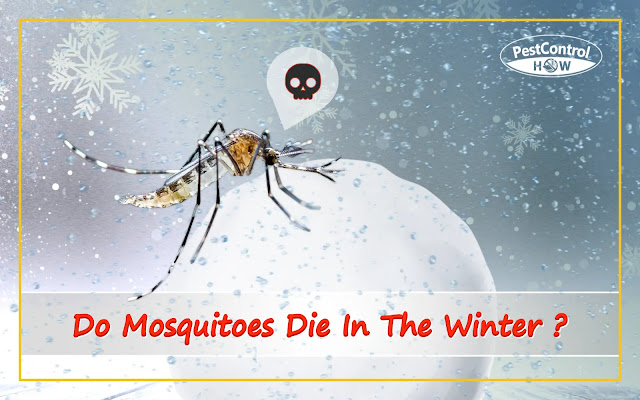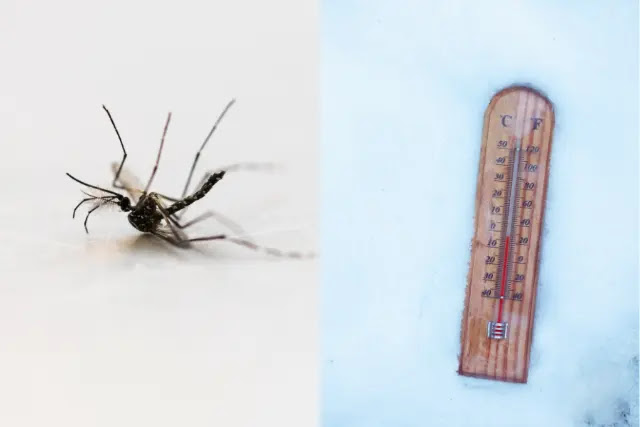As people dread the end of summer and the beginning of shorter days, there may be a silver lining in the cloud. The peak of mosquito season is usually in summer as the warmer temperatures encourage laying eggs in abundance and fastening their hatching.
Mosquitoes tend to torment humans throughout this time of the year. But towards the end of summer, you will notice a drastic decline in mosquito bites and the number of mosquitoes around. Winter may mean bidding goodbye to these dreaded insects and the threat of the Zika virus!
So, where do mosquitoes go in the winter? Even more specifically, do mosquitoes die in the winter?
Let's quickly go over the mosquito lifecycle to better understand seasonal mosquito activities.
The Life Cycle Of A Mosquito
A mosquito typically goes through four life cycles: Egg, larvae, pupae, and adult. A complete mosquito life cycle, from egg to adult, usually takes up to 8-14 days, or much longer depending on environmental conditions!
Once the female lays eggs, often inside containers holding water, the eggs will hatch within a few days while the pupae develop into a fully matured flying mosquito within 2-3 days.
Note that there are nearly 3,500 varying mosquito species worldwide, each of which has a completely distinct way of life and adaptations.
With the onset of cold weather, some adult mosquitoes of different species may become inactive and hibernate to survive winter.
Other species like the Aedes species mosquito, which is responsible for transmitting the dreaded Zika virus to people, usually overwinters in the egg stage.
Where Do Mosquitoes Go In The Winter?
Contrary to what most people assume, mosquitoes don't just magically vanish during the winter.
Like most other insects, mosquitoes are cold-blooded. This means that their body temperatures vary with the temperature of the environment. Because they are incapable of regulating their internal temperatures and heat, mosquitoes are especially vulnerable to harsh winter weather. And their body processes typically slow down during this season.
Mosquitoes thrive in humid climates, and they are typically highly active at temperatures of 80 °F. However, they will become lethargic or less active when temperatures drop to 60°F. Should temperatures go below 50°F, most mosquito species will become completely inactive and won't function!
Some adult mosquito species become inactive and enter hibernation to survive winter. Others overwinter in the larvae stage, where the larvae are usually buried in the muddy floor of freshwater swamps. When temperatures begin to rise in spring, the larvae will start feeding to complete their life cycle.
Other species like the Aedes species mosquito overwinter at the egg stage. The adult female lays its last batch of winter-hardy eggs in late summer. The eggs can be submerged under ice, and in some cases, they can be laid in containers holding even as little as an inch of water.
The female eventually dies as the newly laid eggs enter a state of diapause (a period of suspended development triggered by environmental cues like cold weather). These eggs usually hatch in spring when the weather gets warmer and the water temperature starts to rise.
Some other species of mosquitoes have been found to overwinter as fertile adult females. The females mate in the fall and enter hibernation, usually in basements or animal burrows. They survive the winter in a state of torpor or physical inactivity.
In spring, these females will emerge from hibernation and seek a blood meal to provide the nutrients required for egg production. The eggs will hatch to start the next generation of these undeniably nasty pests.
Do Mosquitoes Die In The Winter?
Not all mosquitoes are made to tough out the cold winter weather. When temperatures drop below 50°F, some mosquitoes enter hibernation while others become completely inactive and eventually die. But to the disappointment of many homeowners, only a few mosquitoes will die with the onset of winter.
According to the University of Alaska, mosquitoes have been in existence for nearly 226 million years! As you might imagine, they have adapted to different weather and can tolerate a massive range of temperatures, including the harsh winter.
The winter will undoubtedly slow down mosquito activities like reproduction, forcing many into hibernation and a few others to die. And even though some mosquitoes will die in the winter, remember that the eggs laid are winter-hardy and will survive the cold weather!
Do Mosquitoes Bite In The Winter?
Mosquitoes generally become inactive when the temperatures decrease. And though survival tactics differ from species to species, nearly all types of mosquitoes won't bite when temperatures drop below 10°F.
As seen above, the mosquitoes that stay alive during winter hibernate and hide in places like basements, storm sewers, animal burrows, and unused items like tires and waste boxes.
Besides hibernating throughout winter, mosquitoes can also go into a state of diapause (a period of suspended development) and only resume development when spring begins. In a nutshell, mosquitoes don't bite in winter. So if you woke up with an insect bite, the high chances are that a flea or bed bug is the culprit.
But once temperatures begin to rise, mosquitoes will emerge from hibernation or diapause. The females will seek a blood meal to aid in egg development and start the next mosquito generation.
How To Prevent Mosquito Bites
Every bite from a mosquito carries serious risks. Mosquitoes are responsible for spreading viruses and parasites that can cause severe and even life-threatening diseases like yellow fever, malaria, and the Nile virus.
Their bites can be painful, itchy, and warm to the touch. Sometimes, these uncomfortable bites can even take days to go away! Therefore, it's very important that homeowners learn how to prevent mosquito bites effectively:
- Inspect your entire home thoroughly and get rid of any water-holding items like waste containers, flower pots, birdbaths, and grill covers that could encourage mosquito breeding. Sometimes, these items may even contain mosquito eggs deposited waiting to hatch when temperatures begin to rise. If you can't get rid of the item, empty the collected water.
- Keep windows and doors closed at all times to deny mosquitoes all possible entry points into your house. Consider weather-stripping doors and adding tightly fitting screens to your windows. If you already have screens, inspect them regularly to ensure there are no small tears. Any cracks and small openings on walls should be repaired.
- Regularly inspect and unclog gutters and sewage. You must repair all leakages in pipes, drains, and faucets both inside and outside your home. Ensure the water in your bathroom is draining properly and trash cans are kept tightly sealed at all times.
- Consider applying a safe and highly effective spray repellent when going outdoors to avoid getting bitten by mosquitoes. Young babies and expectant women should have their doctors recommend a safe and effective repellent to protect from all types of mosquitoes. You must read the instructions on the product labeling before application.
- It is a good idea to stay indoors while wearing the right clothes such as long sleeves and long pants to prevent mosquito bites. Mosquitoes are nocturnal, meaning they are most active at night and feed when it's dark. For these reasons, it's important that you avoid being outdoors too early in the morning or late at night. If that's not possible, wear the right clothing and apply a safe repellent.
Recommended reading:



